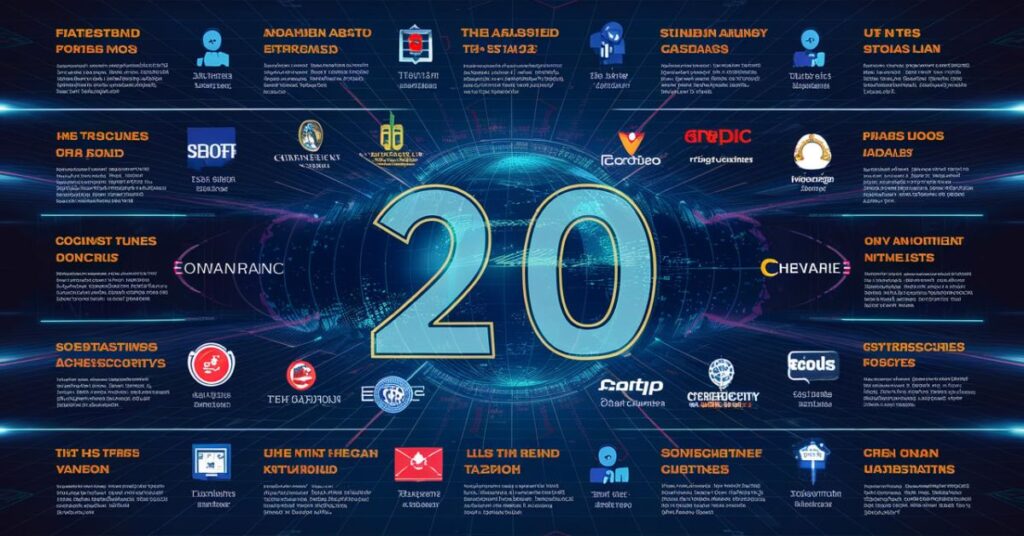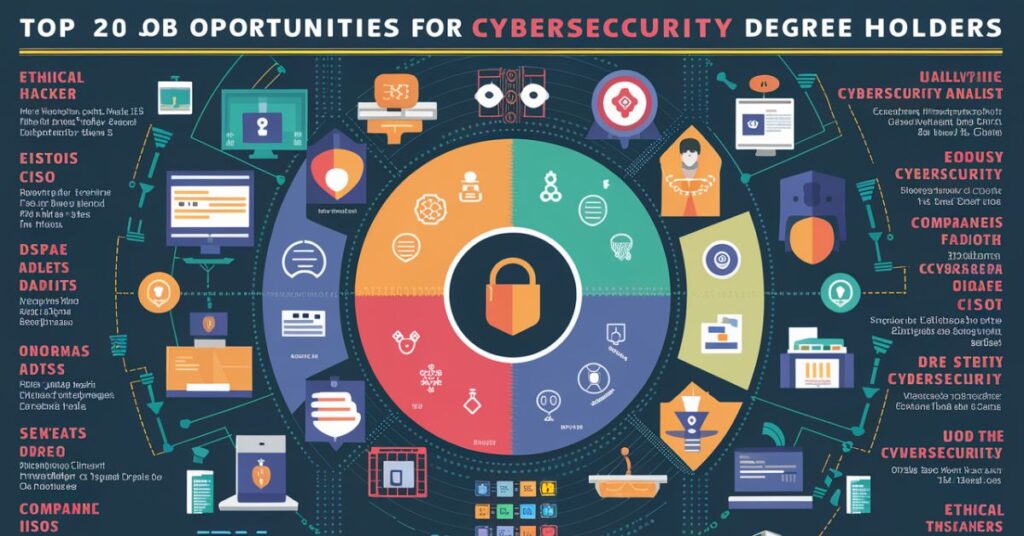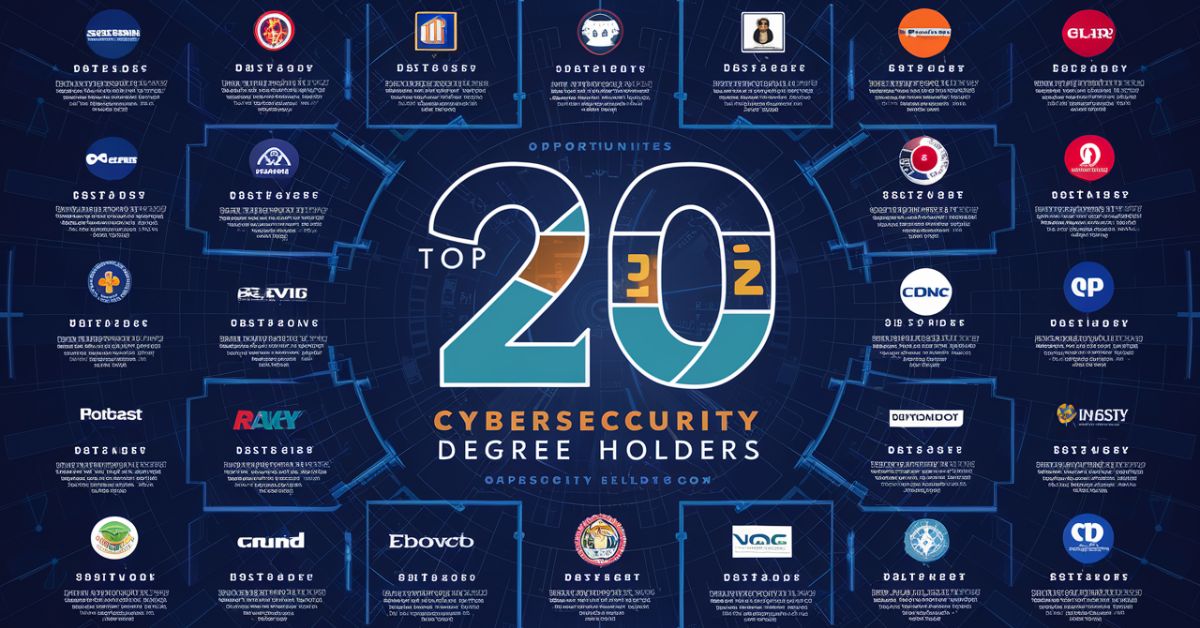In today’s digital age, the demand for cybersecurity professionals has skyrocketed. As cyber threats evolve and become more sophisticated, organizations across all sectors are scrambling to fortify their digital defenses. This surge in demand has created a wealth of opportunities for those with cybersecurity degrees.
Whether you’re a recent graduate or considering a career change, the field of cybersecurity offers a diverse array of roles that are both challenging and rewarding. In this comprehensive guide, we’ll explore the top 20 jobs for your cybersecurity degree and highlight which companies are actively seeking talent in this dynamic field. Top 20 jobs for your cybersecurity degree & who’s hiring.
1. Cybersecurity Analyst
Cybersecurity analysts are the frontline defenders in the digital realm. These professionals monitor networks for security breaches, investigate incidents, and implement protective measures to safeguard an organization’s information systems.
Key Responsibilities:
- Continuously monitor networks for security incidents
- Analyze security breaches and respond to cyber attacks
- Implement and update security measures
- Conduct vulnerability assessments and risk analyses
Required Skills:
- Strong analytical thinking
- Proficiency in security information and event management (SIEM) tools
- Knowledge of intrusion detection systems
- Excellent problem-solving abilities
Certifications that can boost your career:
- CompTIA Security+
- Certified Information Systems Security Professional (CISSP)
- Certified Ethical Hacker (CEH)
The average salary range for cybersecurity analysts in the USA is $75,000 to $110,000, depending on experience and location. Companies like IBM, Cisco, and Deloitte are constantly looking for skilled cybersecurity analysts.
2. Cybersecurity Engineer
Cybersecurity engineers design and implement secure network solutions to defend against advanced cyber threats. They are crucial in developing and maintaining an organization’s security infrastructure.
Key Duties:
- Design and implement secure network architectures
- Develop security systems and processes
- Perform regular security audits and assessments
- Respond to and mitigate security incidents
Technical Expertise Required:
- Proficiency in programming languages (e.g., Python, Java)
- In-depth knowledge of network protocols and encryption technologies
- Experience with cloud security platforms
- Understanding of DevSecOps practices
Career progression for cybersecurity engineers often leads to roles such as Senior Security Engineer or Security Architect. Salary expectations range from $90,000 to $150,000+, with top performers earning even more.
Top Employers Seeking Cybersecurity Engineers:
- Amazon Web Services (AWS)
- Microsoft
- Lockheed Martin
- Northrop Grumman
3. Information Security Analyst

While often confused with cybersecurity analysts, information security analysts focus more broadly on protecting an organization’s entire information ecosystem, including physical documents and digital assets.
Crucial Tasks:
- Develop and implement comprehensive information security policies
- Conduct security awareness training for employees
- Manage access controls and identity management systems
- Oversee data classification and protection strategies
Information security analysts need to stay abreast of the latest security trends and compliance requirements. They often work closely with legal and HR departments to ensure company-wide adherence to security protocols.
Industry-Specific Demands:
- Financial Services: Focus on protecting sensitive financial data and compliance with regulations like PCI DSS
- Healthcare: Emphasis on HIPAA compliance and safeguarding patient information
- Government: Adherence to strict security clearances and handling of classified information
Prominent organizations recruiting information security analysts include JPMorgan Chase, Kaiser Permanente, and various federal agencies.
4. Cybersecurity Officer
As a leadership role, the Cybersecurity Officer (often titled Chief Information Security Officer or CISO) oversees an organization’s cybersecurity strategy.
Strategic Planning and Policy Implementation:
- Develop and maintain the organization’s cybersecurity vision and strategy
- Align security initiatives with business objectives
- Manage the cybersecurity budget and resource allocation
- Ensure compliance with relevant laws and regulations
Cybersecurity Officers need a blend of technical expertise, business acumen, and leadership skills. They must be able to communicate complex security concepts to non-technical stakeholders and board members.
Compensation Trends:
According to recent surveys, the average CISO salary in the USA ranges from $165,000 to $250,000+, with additional bonuses and stock options often included in compensation packages.
Fortune 500 Companies with Open CISO Positions:
- Walmart
- ExxonMobil
- Apple
- General Motors
- Pfizer
5. Penetration Tester
Also known as ethical hackers, penetration testers play a crucial role in identifying vulnerabilities in an organization’s security posture before malicious actors can exploit them.
Importance of Ethical Hacking:
Penetration testing simulates real-world attacks to uncover weaknesses in systems, networks, and applications. This proactive approach allows organizations to address vulnerabilities before they can be exploited by cybercriminals.
Required Technical Skills:
- Proficiency in various operating systems (Linux, Windows, macOS)
- Knowledge of networking protocols and common vulnerabilities
- Familiarity with security testing tools (e.g., Metasploit, Burp Suite, Nmap)
- Programming skills in languages like Python and Ruby
Penetration testers often report high job satisfaction due to the challenging and dynamic nature of their work. Earning potential ranges from $80,000 to $130,000+, with experienced professionals commanding even higher salaries.
Companies Hiring Pen Testers:
- Startups: Rapid7, HackerOne
- Established Firms: FireEye, Crowdstrike
- Consulting Giants: PwC, KPMG
6. Security Architect

Security architects are the masterminds behind an organization’s cybersecurity infrastructure. They design comprehensive security systems that protect against current and future threats.
System Design and Infrastructure Planning:
- Create and maintain security architecture blueprints
- Evaluate and select appropriate security technologies
- Develop security standards and best practices
- Collaborate with IT teams to ensure secure integration of new technologies
Advanced Certifications for Career Advancement:
- Certified Information Systems Security Professional (CISSP)
- GIAC Security Expert (GSE)
- Certified Information Security Manager (CISM)
- Certified Ethical Hacker (CEH)
Security architects are among the highest-paid professionals in the cybersecurity field, with salaries ranging from $120,000 to $200,000+.
Tech Giants Seeking Security Archives:
- Facebook (Meta)
- Netflix
- Salesforce
- Oracle
- Adobe
7. Security Manager
Security managers bridge the gap between technical cybersecurity teams and upper management. They oversee security operations and ensure that security measures align with business objectives.
Team Leadership and Project Management Aspects:
- Manage a team of security professionals
- Develop and implement security policies and procedures
- Oversee security awareness training programs
- Coordinate incident response activities
A blend of Technical and Soft Skills Required:
- Strong leadership and communication abilities
- Project management expertise
- In-depth understanding of cybersecurity principles and best practices
- Knowledge of relevant compliance standards (e.g., GDPR, HIPAA, SOC 2)
Compensation packages for security managers often include base salaries ranging from $110,000 to $160,000, plus bonuses and other benefits.
Multinational Corporations with Security Manager Vacancies:
- Procter & Gamble
- Unilever
- Johnson & Johnson
- Coca-Cola Company
- PepsiCo
8. Security Specialist
Security specialists are versatile professionals who can adapt to various roles within the cybersecurity landscape. Their expertise can be applied across different industries and specialized areas of security.
Specialization Options within Security:
- Network Security
- Application Security
- Cloud Security
- IoT Security
- Mobile Device Security
Salary ranges for security specialists vary widely based on experience and specialization, typically falling between $70,000 and $120,000.
Government Agencies and Private Sector Openings:
- Government: NSA, FBI, DHS
- Private Sector: Boeing, Raytheon, General Dynamics
9. Cyber Policy and Strategy Planner
Cyber policy and strategy planners play a crucial role in shaping an organization’s long-term security posture. They develop comprehensive strategies that address current and future cyber threats while aligning with business objectives.
Importance in Shaping Organizational Security Posture:
- Anticipate future cyber threats and trends
- Develop long-term security roadmaps
- Align cybersecurity initiatives with business goals
- Ensure compliance with evolving regulations and standards
Required Background:
- Strong understanding of cybersecurity principles
- Knowledge of policy development and implementation
- Familiarity with relevant laws and regulations
- Strategic thinking and analytical skills
Earning potential for cyber policy and strategy planners can range from $90,000 to $150,000+, depending on the sector and level of responsibility.
Organizations Hiring Planners:
- Think Tanks: Center for Strategic and International Studies (CSIS), RAND Corporation
- Consultancies: McKinsey & Company, Boston Consulting Group
- Government Agencies: Department of Defense, Department of Homeland Security
10. Information Technology (IT) Auditor
IT auditors evaluate an organization’s information systems, infrastructure, and operations to ensure they meet compliance requirements and industry standards.
Compliance and Risk Assessment Focus:
- Conduct internal and external IT audits
- Assess the effectiveness of IT controls
- Identify and report on security vulnerabilities
- Ensure compliance with relevant regulations (e.g., SOX, GDPR)
Necessary Certifications:
- Certified Information Systems Auditor (CISA)
- Certified Internal Auditor (CIA)
- Certified Information Systems Security Professional (CISSP)
Salary expectations for IT auditors range from $75,000 to $130,000, with senior positions commanding higher compensation.
Firms Recruiting IT Auditors:
- Big Four: Deloitte, PwC, EY, KPMG
- Financial Institutions: JP Morgan Chase, Bank of America
- Tech Companies: Amazon, Microsoft, Oracle
11. Cyber Workforce Developer
As the cybersecurity skills gap continues to widen, cyber workforce developers play a crucial role in addressing this challenge by training and nurturing the next generation of security professionals.
Role in Addressing the Cybersecurity Skills Gap:
- Develop and implement cybersecurity training programs
- Identify skill gaps within organizations
- Create career development pathways for security professionals
- Collaborate with educational institutions to align curricula with industry needs
Training and Mentorship Responsibilities:
- Conduct hands-on training sessions and workshops
- Develop e-learning modules and training materials
- Mentor junior security professionals
- Organize capture-the-flag (CTF) events and security competitions
Compensation for cyber workforce developers typically ranges from $80,000 to $140,000, with opportunities for growth in both corporate and academic settings.
Organizations Hiring Cyber Workforce Developers:
- SANS Institute
- (ISC)²
- CompTIA
- Large corporations with internal cybersecurity academies
12. Cyber Instructional Curriculum Developer
Cyber instructional curriculum developers design cutting-edge educational programs to prepare students and professionals for the ever-evolving cybersecurity landscape.
Designing Cutting-Edge Cybersecurity Education Programs:
- Create comprehensive cybersecurity curricula
- Develop hands-on lab exercises and simulations
- Integrate emerging technologies and threats into course materials
- Align curricula with industry certifications and standards
The blend of Educational and Technical Expertise Required:
- In-depth knowledge of cybersecurity principles and practices
- Understanding of instructional design methodologies
- Familiarity with e-learning platforms and technologies
- Ability to adapt curricula for different learning styles and levels
Salary ranges for cyber instructional curriculum developers in academia and corporate settings typically fall between $70,000 and $120,000.
Institutions Seeking Developers:
- Universities: Georgia Tech, Carnegie Mellon, MIT
- Online Learning Platforms: Coursera, edX, Udacity
- Professional Training Organizations: EC-Council, Offensive Security
13. Cyber Defense Forensics Analyst
Cyber defense forensics analysts play a crucial role in investigating security incidents and gathering digital evidence for potential legal proceedings.
Digital Investigation and Evidence Handling:
- Conduct forensic analysis of compromised systems
- Recover and analyze digital evidence
- Document findings for use in legal proceedings
- Develop and implement forensic investigation procedures
Technical Tools and Legal Knowledge Needed:
- Proficiency in forensic analysis tools (e.g., EnCase, FTK, Autopsy)
- Understanding of file systems and data recovery techniques
- Knowledge of chain of custody procedures
- Familiarity with relevant laws and regulations
Earning potential for cyber defense forensics analysts ranges from $80,000 to $140,000, with opportunities in both the public and private sectors.
Organizations Hiring Forensics Analysts:
- Government Agencies: FBI, Secret Service, Local Law Enforcement
- Cybersecurity Firms: FireEye, CrowdStrike, Mandiant
- Financial Institutions: Major banks and credit card companies
14. Vulnerability Assessment Analyst
Vulnerability assessment analysts focus on identifying and evaluating security weaknesses in an organization’s systems and applications before they can be exploited by malicious actors.
Proactive Security Measures and System Testing:
- Conduct regular vulnerability scans and assessments
- Analyze and prioritize identified vulnerabilities
- Recommend and implement remediation strategies
- Stay updated on emerging threats and vulnerabilities
Required Skills in Various Assessment Methodologies:
- Proficiency in vulnerability scanning tools (e.g., Nessus, Qualys, OpenVAS)
- Knowledge of common vulnerabilities and exposures (CVE)
- Understanding of risk assessment frameworks
- Familiarity with secure coding practices
Salary expectations for vulnerability assessment analysts typically range from $75,000 to $125,000, depending on experience and industry.
Companies Recruiting:
- Tech Companies: Microsoft, Oracle, Cisco
- Security Consultancies: NCC Group, Trustwave, Secureworks
- Financial Services: Visa, Mastercard, American Express
15. Cyber Defense Incident Responder
Cyber defense incident responders are the rapid response team in the event of a security breach or cyber attack. They play a critical role in minimizing damage and restoring normal operations.
Crisis Management and Rapid Response Capabilities:
- Develop and maintain incident response plans
- Lead the response to active security incidents
- Perform damage assessment and containment
- Conduct post-incident analysis and reporting
Technical and Communication Skills Essential:
- Proficiency in incident response tools and techniques
- Strong analytical and problem-solving abilities
- Excellent communication skills for coordinating with various stakeholders
- Ability to work effectively under pressure
Compensation trends for cyber defense incident responders reflect the high-stress nature of the role, with salaries ranging from $85,000 to $150,000+.
Managed Security Service Providers Hiring Responders:
- IBM Security
- Accenture Security
- Verizon Business
- AT&T Cybersecurity
16. Security Systems Administrator
Security systems administrators are responsible for the day-to-day management and maintenance of an organization’s security infrastructure.
Day-to-Day Management of Security Infrastructure:
- Configure and maintain security systems and tools
- Manage user access and permissions
- Monitor system logs and security alerts
- Implement and update security patches and upgrades
Required Certifications and Hands-On Experience:
- CompTIA Security+
- GIAC Security Essentials (GSEC)
- Microsoft Certified: Azure Security Engineer Associate
- Cisco Certified Network Associate (CCNA) Security
Salary ranges for security systems administrators vary across industries, typically falling between $70,000 and $120,000. Top 20 jobs for your cybersecurity degree & who’s hiring.
Organizations Recruiting:
- Financial Institutions: Wells Fargo, Citigroup
- Healthcare Organizations: UnitedHealth Group, CVS Health
- Technology Companies: Dell, HP, Intel
17. Cryptography Engineer
Cryptography engineers play a vital role in designing and implementing secure communication systems and encryption protocols.
Importance of Encryption in Modern Cybersecurity:
Encryption is the cornerstone of data protection, ensuring confidentiality and integrity of sensitive information in transit and at rest. As cyber threats evolve, so must encryption technologies to stay ahead of potential vulnerabilities. Top 20 jobs for your cybersecurity degree & who’s hiring.
Advanced Mathematical and Coding Skills Required:
- Strong background in mathematics, particularly number theory and abstract algebra
- Proficiency in programming languages such as C++, Python, and Rust
- Understanding of cryptographic algorithms and protocols
- Knowledge of hardware security modules (HSMs) and secure key management
Cryptography engineers command some of the highest salaries in the cybersecurity field, with compensation packages often ranging from $120,000 to $200,000+.
Tech Innovators and Defense Contractors Hiring:
- Apple
- Northrop Grumman
- Palantir Technologies
- Signal
18. Computer Network Defense Analyst
Computer network defense analysts are the vigilant guardians of an organization’s network infrastructure, constantly monitoring for and responding to potential threats.
Certainly, I’ll continue with the blog post:
18. Computer Network Defense Analyst
Computer network defense analysts are the vigilant guardians of an organization’s network infrastructure, constantly monitoring for and responding to potential threats. Top 20 jobs for your cybersecurity degree & who’s hiring.
Network Security Monitoring and Threat Detection:
- Implement and manage intrusion detection/prevention systems (IDS/IPS)
- Analyze network traffic for suspicious activities
- Conduct regular vulnerability assessments and penetration testing
- Develop and maintain network security policies and procedures
Essential Skills and Tools for Effective Defense:
- Proficiency in network protocols and architectures
- Experience with SIEM tools (e.g., Splunk, LogRhythm, QRadar)
- Knowledge of malware analysis and reverse engineering
- Familiarity with threat intelligence platforms
Compensation packages for computer network defense analysts typically range from $80,000 to $140,000, depending on experience and sector. Top 20 jobs for your cybersecurity degree & who’s hiring.
Organizations Seeking Analysts:
- Telecom Companies: Verizon, AT&T, T-Mobile
- Managed Service Providers: IBM, Accenture, Deloitte
- Government Agencies: Department of Defense, NSA, CIA
19. Cybersecurity Incident Handler
While similar to incident responders, cybersecurity incident handlers focus more on the process of managing and coordinating the response to security events across an organization. Top 20 jobs for your cybersecurity degree & who’s hiring.
Key Responsibilities in Managing Security Events:
- Develop and maintain incident response plans and playbooks
- Coordinate communication between technical teams and stakeholders
- Perform triage on reported security incidents
- Document and track incidents from detection to resolution
Distinction from Incident Responder Role:
Incident handlers focus more on the overall management and coordination of the incident response process, while incident responders are more hands-on in investigating and mitigating the technical aspects of a breach.
Salary expectations for cybersecurity incident handlers range from $85,000 to $130,000, with senior positions commanding higher compensation. Top 20 jobs for your cybersecurity degree & who’s hiring.
Sectors Hiring Handlers:
- Energy Sector: ExxonMobil, Chevron, Duke Energy
- Critical Infrastructure: Water treatment facilities, power plants
- Healthcare: Hospital systems, health insurance providers
20. Network Engineer
While not exclusively a cybersecurity role, network engineers play a crucial part in implementing and maintaining secure network infrastructures. Top 20 jobs for your cybersecurity degree & who’s hiring.
Cybersecurity Aspects of Network Engineering:
- Designing and implementing secure network architectures
- Configuring firewalls and other network security devices
- Implementing virtual private networks (VPNs) and network segmentation
- Collaborating with security teams to address network-related vulnerabilities
Required Networking Certifications and Security Knowledge:
- Cisco Certified Network Professional (CCNP)
- CompTIA Network+
- Juniper Networks Certified Internet Specialist (JNCIS-SEC)
- Palo Alto Networks Certified Network Security Engineer (PCNSE)
Network engineers with strong security skills can expect salaries ranging from $75,000 to $130,000+, with opportunities for growth in both technical and management tracks.
Companies with Open Positions:
- Internet Service Providers: Comcast, Charter Communications
- Cloud Service Providers: Amazon Web Services, Microsoft Azure, Google Cloud
- Enterprise IT Departments: Fortune 500 companies across various industries
Which companies are hiring job seekers with cybersecurity degrees on Handshake?
Handshake is a popular platform that connects students and recent graduates with potential employers. It’s an excellent resource for those looking to start their careers in cybersecurity.
Top Companies Actively Recruiting on Handshake:
- Cisco Systems
- Lockheed Martin
- Northrop Grumman
- Deloitte
- KPMG
- PwC
- EY
- Booz Allen Hamilton
- General Dynamics
- Raytheon Technologies
Types of Positions Frequently Posted:
- Security Analyst (Entry-Level)
- Junior Penetration Tester
- Information Assurance Specialist
- SOC Analyst
- IT Security Associate
Tips for Leveraging Handshake for Cybersecurity Careers:
- Complete your profile thoroughly, highlighting relevant coursework and projects
- Use keyword searches specific to cybersecurity roles
- Attend virtual career fairs hosted on the platform
- Set up job alerts for cybersecurity positions
- Engage with employer representatives through the messaging feature
FAQs
Q: What can I be if I study cyber security?
Studying cybersecurity opens doors to a wide range of career paths. Some options include:
- Cybersecurity Analyst
- Information Security Manager
- Penetration Tester
- Security Archite
- Incident Response Specialist
- Cryptographer
- Digital Forensics Examiner
- Security Consultant
- Chief Information Security Officer (CISO)
The versatility of a cybersecurity degree allows you to specialize in areas that align with your interests and strengths.
Q: Is a cyber security degree worth it?
Absolutely. A cybersecurity degree is a valuable investment in today’s digital landscape. Here’s why:
- High demand: The cybersecurity field is experiencing a significant skills gap, with more jobs available than qualified professionals to fill them.
- Competitive salaries: Cybersecurity roles often command above-average salaries due to the specialized skills required.
- Job security: As cyber threats continue to evolve, the need for cybersecurity professionals is only expected to grow.
- Career growth: The field offers numerous opportunities for advancement and specialization.
- Transferable skills: The knowledge gained in a cybersecurity program is applicable across various industries and roles.
Q: Is cyber security good for your career?
Cybersecurity is an excellent career choice for several reasons:
- Long-term outlook: The Bureau of Labor Statistics projects a 31% growth in information security analyst jobs from 2019 to 2029, much faster than the average for all occupations.
- Continuous learning: The ever-evolving nature of cyber threats means professionals must constantly update their skills, providing ongoing intellectual stimulation.
- Global opportunities: Cybersecurity skills are in demand worldwide, offering potential for international career prospects.
- Diverse industry applications: Every sector, from finance to healthcare to government, requires cybersecurity professionals.
- Meaningful work: Cybersecurity professionals play a crucial role in protecting sensitive data and critical infrastructure, contributing to the greater good.
Q: What is the highest-paying job in cyber security?
While salaries can vary based on location, experience, and specific company, some of the highest-paying cybersecurity jobs include:
- Chief Information Security Officer (CISO): $165,000 – $250,000+
- Security Architect: $120,000 – $200,000+
- Cybersecurity Manager: $110,000 – $160,000+
- Penetration Tester (senior level): $100,000 – $150,000+
- Information Security Manager: $120,000 – $180,000+
Q: Which pays more, cybersecurity or IT?
On average, cybersecurity roles tend to command higher salaries than general IT positions due to the specialized skills and knowledge required. However, it’s important to consider several factors:
- Specialization: Highly specialized IT roles (e.g., cloud architects, AI specialists) can earn salaries comparable to or higher than some cybersecurity positions.
- Experience level: Senior IT professionals may earn more than entry-level cybersecurity analysts.
- Industry and location: Salaries in both fields can vary significantly based on the industry and geographic location.
- Certifications: Advanced certifications in either field can lead to higher earning potential.
Conclusion
The field of cybersecurity offers a wealth of diverse and rewarding career opportunities for those with the right skills and qualifications. From hands-on technical roles like penetration testers and forensics analysts to strategic positions such as security architects and policy planners, there’s a place for a wide range of interests and aptitudes within the cybersecurity landscape.
As cyber threats continue to evolve and expand, the demand for skilled professionals in this field is only expected to grow. A cybersecurity degree provides a solid foundation for entering this dynamic and crucial field, opening doors to challenging, well-compensated roles across various industries.








